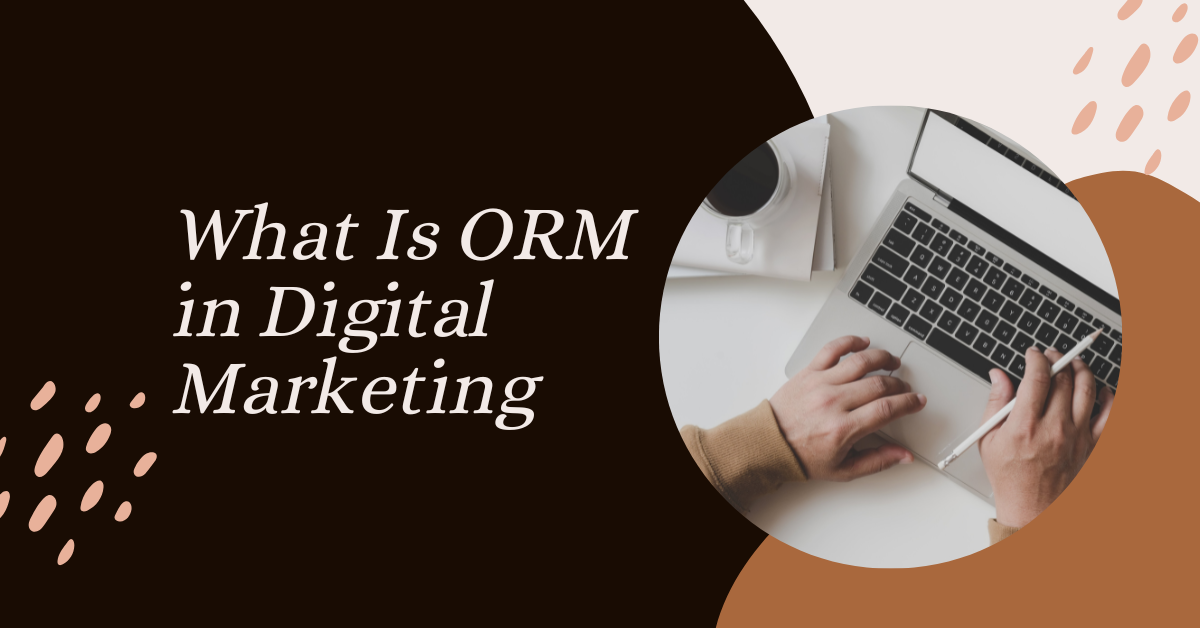In today’s digital age, a brand’s online presence can make or break its success. With the vast array of social media platforms, review sites, and forums, consumers have more ways than ever to voice their opinions and experiences with a brand. This has given rise to the need for effective Online Reputation Management (ORM) in digital marketing. In this comprehensive guide, we’ll explore what ORM is, why it’s crucial for businesses, and how to implement it successfully to safeguard and enhance your online reputation.
Understanding ORM: The Basics
What Is ORM in Digital Marketing?
Online Reputation Management, often abbreviated as ORM, refers to the practice of monitoring, influencing, and managing an individual or organization’s online reputation. This reputation encompasses everything people can find about you on the internet, from social media posts and customer reviews to news articles and blog mentions.
The Significance of Online Reputation
In the digital age, your online reputation is akin to your brand’s public image. It’s how people perceive you when they search for your name or company online. A positive online reputation can build trust, attract customers, and drive business growth, while a negative one can lead to lost opportunities, damaged relationships, and a decline in sales.
Components of Online Reputation
To fully grasp ORM, it’s essential to understand the key components that contribute to your online reputation:
- Content: Any information available online about your brand, including website content, blog posts, and social media updates.
- Reviews and Ratings: Feedback and ratings from customers on platforms like Yelp, Google Reviews, and TripAdvisor.
- Social Media Presence: How active and engaging your brand is on social media platforms such as Facebook, Twitter, Instagram, and LinkedIn.
- Search Engine Results: What appears when people search for your brand on search engines like Google, Bing, or Yahoo.
- Media Coverage: News articles, press releases, and mentions in online publications.
Why ORM Matters in Digital Marketing
Building Trust and Credibility
A positive online reputation is vital for building trust and credibility with your target audience. When potential customers see a consistent stream of positive reviews and engaging content, they are more likely to trust your brand and make a purchase.
Influence Purchase Decisions
Consumers often research products and services online before making a purchase. Positive reviews, testimonials, and a strong online presence can sway their decisions in your favor.
Managing Negative Feedback
Negative comments and reviews are inevitable. ORM helps you address these issues promptly and professionally, demonstrating your commitment to customer satisfaction.
Attracting Top Talent
A positive online reputation not only attracts customers but also top talent. Talented individuals are more likely to want to work for a reputable company.
Competitive Advantage
In a competitive market, a strong online reputation can set you apart from your rivals. It can be the deciding factor for customers choosing between you and your competitors.
The ORM Process: How It Works
1. Monitoring Your Online Presence
The first step in ORM is monitoring. You need to know what people are saying about your brand. This involves tracking mentions, reviews, and comments across various online platforms.
2. Analyzing the Data
Once you’ve collected data about your online presence, it’s essential to analyze it. Identify trends, common feedback, and areas where improvement is needed.
3. Responding to Feedback
Engaging with your audience is a crucial part of ORM. Responding to both positive and negative feedback shows that you value your customers’ opinions and are committed to improving their experience.
4. Creating High-Quality Content
Publishing high-quality content that showcases your brand’s expertise and values can help shape a positive image. Regular blog posts, social media updates, and informative videos can all contribute to a strong online presence.
5. Building a Strong Social Media Presence
Social media platforms are often where customers interact with brands. Maintaining an active and engaging presence on these platforms is essential for ORM.
6. Encouraging Positive Reviews
Satisfied customers can be your best advocates. Encourage them to leave positive reviews on relevant platforms to boost your reputation.
7. Addressing Negative Feedback
When you receive negative feedback, it’s crucial to address it professionally and constructively. Offer solutions, apologize when necessary, and strive to turn negative experiences into positive ones.
8. Search Engine Optimization (SEO)
Optimizing your online content for search engines can help push positive information about your brand to the top of search results, making it more visible to potential customers.
9. Tracking Progress
Continuously monitor your online reputation and track your progress. Use tools and metrics to measure the impact of your ORM efforts.
ORM Tools and Resources
1. Google Alerts
Google Alerts is a free tool that allows you to monitor mentions of your brand or relevant keywords across the web. You can receive email notifications whenever your brand is mentioned.
2. Social Media Monitoring Tools
There are various social media monitoring tools like Hootsuite, Buffer, and Brandwatch that help you track brand mentions and engage with your audience on social platforms.
Find the Best SEO Services in Noida
3. Review Management Platforms
Platforms like Yelp, TripAdvisor, and Trustpilot offer tools for managing customer reviews and responding to feedback.
4. Online Review Solicitation Tools
Tools like TrustRadius and G2 Crowd can help you encourage satisfied customers to leave positive reviews.
5. Online Reputation Management Agencies
For businesses with complex online reputations, ORM agencies specialize in managing and repairing online images. They have the expertise and resources to navigate challenging situations effectively.
Common ORM Challenges
1. Negative Reviews and Comments
Negative feedback is inevitable, but it’s how you handle it that matters. Ignoring or responding poorly to negative comments can damage your reputation further.
2. Online Attacks and Trolls
Some individuals or competitors may engage in online attacks or trolling. These situations require careful handling to prevent escalation.
3. Outdated or Inaccurate Information
Outdated or inaccurate information about your brand can mislead potential customers. Regularly audit and update your online content.
4. Crisis Management
In the event of a public relations crisis, having a well-prepared ORM strategy can help mitigate damage to your reputation.
ORM Best Practices
1. Be Proactive, Not Reactive
Proactively manage your online reputation. Don’t wait for a crisis to start building a positive online image.
2. Consistency Is Key
Maintain a consistent brand image and messaging across all online platforms.
3. Authenticity Matters
Be authentic and transparent in your interactions with customers. Authenticity builds trust.
4. Engage With Your Audience
Engage with your audience regularly on social media and review platforms. Respond to comments, questions, and concerns promptly.
5. Encourage and Showcase Positive Reviews
Highlight positive reviews and testimonials on your website and social media channels. This reinforces your reputation.
6. Learn From Feedback
Use customer feedback, both positive and negative, to improve your products, services, and customer experiences.
Read More :- Best Digital Marketing Agency in Noida
Conclusion
In the digital age, Online Reputation Management (ORM) is not just an option; it’s a necessity for businesses and individuals alike. Your online reputation can influence customer decisions, attract or repel talent, and ultimately impact your bottom line. By actively monitoring, analyzing, and engaging with your online presence, you can build and maintain a positive image that inspires trust and loyalty among your audience.




